|
09:71.82S 147:08.57E
4th August, 2010
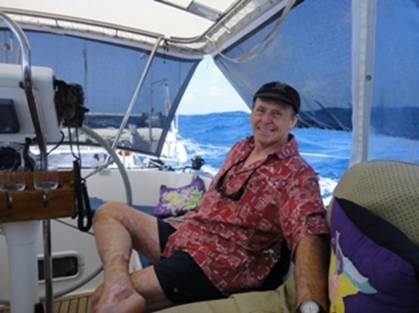
After a blustery night at sea, with only a small mainsail to propel
us along at 7 knots in 30 knots of wind, we were glad to get behind the
protection of Cape Hood, and noticed a considerable appeasement of the waves!
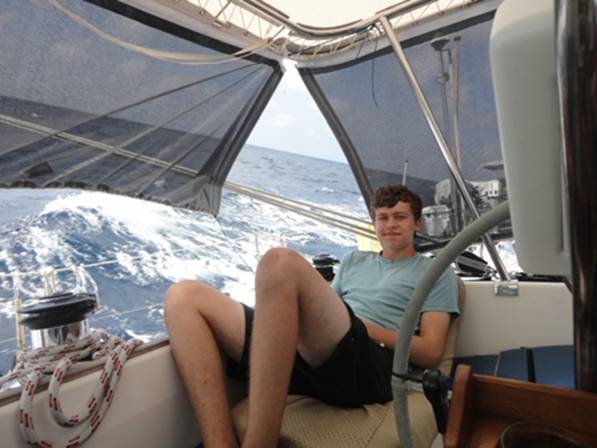
Even Olly managed to overcome his queasiness, get up on his night
watch and help David gybe the boat as we rounded cape Hood, and look happy
when he came out on deck in the morning light! It always takes three days to
get over the uneasy feeling of the heaving boat in a following sea.
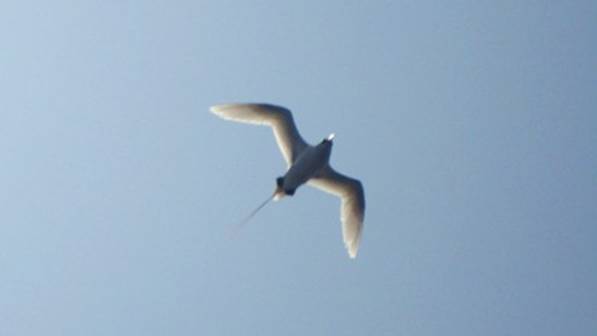
This beautiful white tropic bird flew around us a good half hour,
almost looking for a perch before flying away. They are rarely seen, so we
felt most privileged to have been offered its company for a short while. A larger
brown booby circled us at the same time, maybe they thought we might sling
them some fish!
Port Moresby sits behind a protective reef, which protects not only
this natural harbour, but a few other islands within it too, which we just
might have time to take a look at before we leave again.

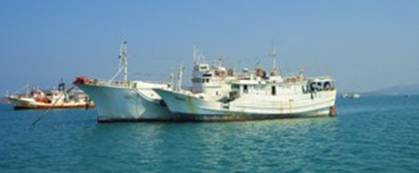
Unable to get hold of the Port Moresby
Yacht Club on VHF, we anchored outside close to these fishing boats. No
doubt are used as transport for people between the islands too, we heard that
they are not too salubrious.
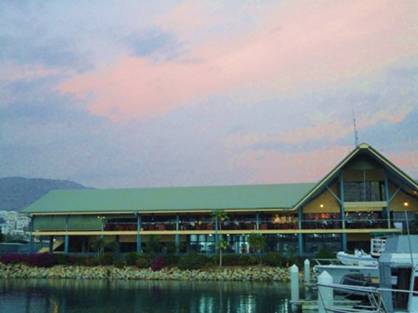
Port Moresby Yacht Club offers a
wonderful haven for the people who live and work in Port Moresby. There are
hardly any visiting yachts. We were so conspicuous, that Brian on S/V Duck
Soup tracked us down next morning offering us his spare berth which had just
become vacant. The yacht club had none to offer larger than 14 Metres, and
we are 19 Metres with our Davits. We were in fact quite happy anchored
outside, as there was a nice breeze to keep us cool. However, knowing we had
a few jobs requiring engineers on board, we decided to take him up on it, and
plug into shore power and enjoy cool air conditioning down below during the
still windless days which followed.
The upstairs area of the Club is one
huge Sports Bar, lounge area and restaurant, both inside and out. Downstairs
is the laundry, showers and a huge gym, which is absolutely essential to the
residents of Port Moresby, their only way to get any exercise!
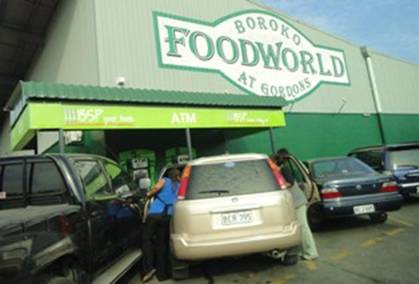
The supermarket is just around the
corner, not as plush as those we have been used to in Phuket, but it stocked
most basic foodstuffs, plus a good deal of imports from Australia and New
Zealand.
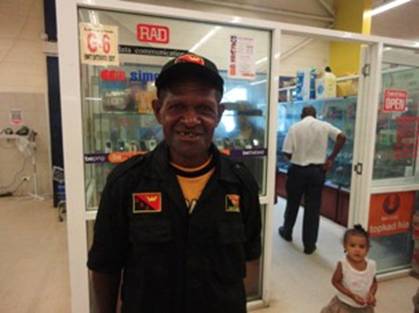
Guards are at the entrance, inside in
the electronic area, and of course pharmacy and alcohol areas. Notice his
teeth are all rotted from chewing the betel nut.
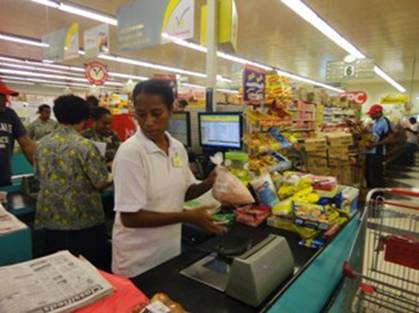
No moving belt for the produce at the
check-out, but at least they could speak English, and were well trained. We
did loads of shopping to replace the stock we had already used, as we still
have another two months travelling in Indonesia before we get to restock
again in Bali.
David got our Indonesian Cruising
Permit (CAIT) underway with an agent in Jakarta, by sending the fee via
Western Union. We were originally told it would take three weeks, but by
sending her half as much again, she said she could chivvy it up to only take
a few days. Having done that, we were then told it would take two weeks,
because of the Muslim Holiday this week!
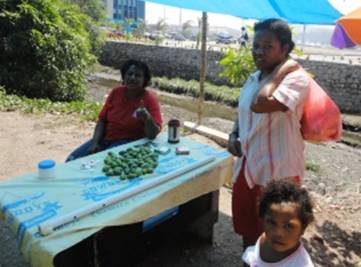
Just outside the ANZ bank, next to the
Yacht Club there is a lady selling betel nut Buai(notice they are not
pointing towards us). Hence the reason for all this blood over the pavement,
whilst walking to the supermarket:
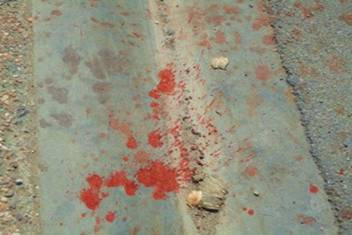
Actually, it’s the colour their
saliva goes when they mix powdered lime (which could be dead coral or even
relatives bones) with the chewed betel nut – YUK! It’s a type of
soporific effect – but mainly it’s taken on big time since their
independence as it is their KASTOM that makes them feel different to the rest
of us!
Needless to say, their founding fathers
are very disappointed that Port Moresby has become the second most dangerous
city in the world (not quite sure where that figure comes from, as I am sure
there are far worse like Caracas (Venezuela) , Port of Spain (Trinidad),
Kingston (Jamaica) etc. It seems that to kill somebody is not done for any
other reason than it seems a good idea at the time!
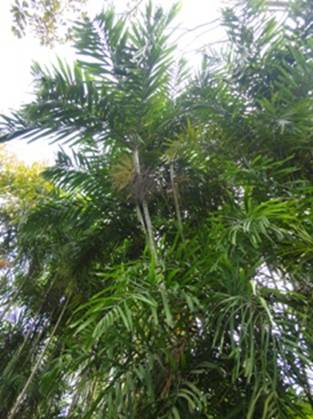
The betel nut comes from this Areca
Palm, the yellow seed pods seen at the top.
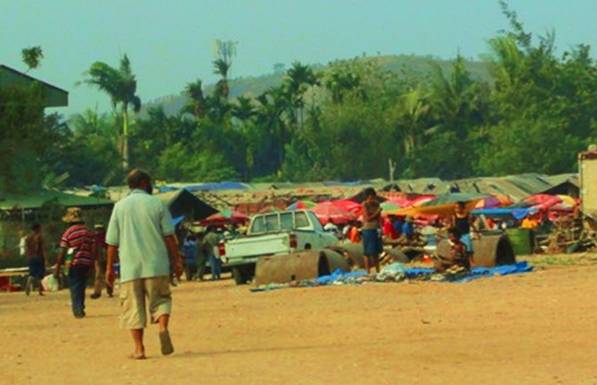
This is the Sunday betel nut market in
Port Moresby – glimpsed as we drove past, on our way to the National
Museum. Brian got his grandson John to drive us there, together with his
wife and two children, which was most kind of him.
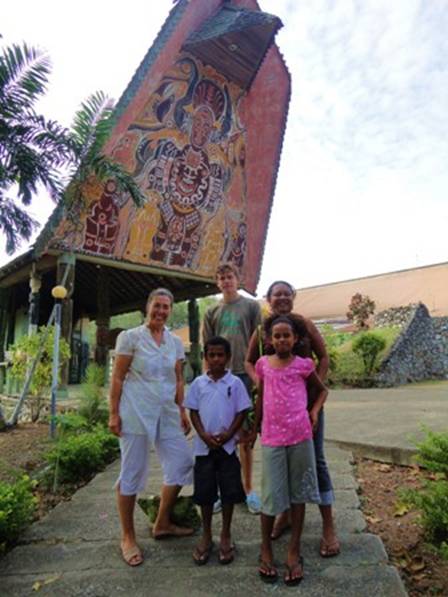
Valerie, Jacob, Ollie, Ellen and Wawie
outside the National Museum
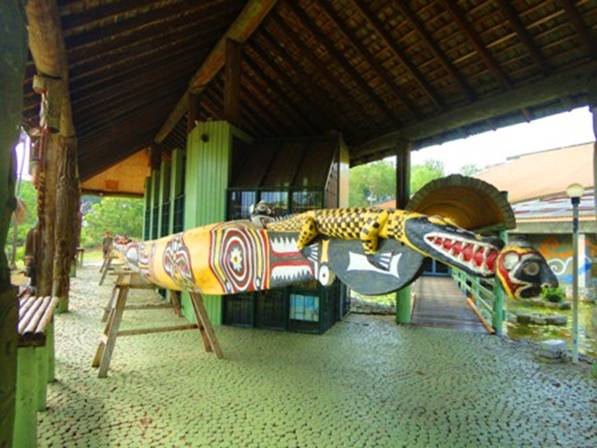
This very long canoe cannot be
imagined, but just look how far away Ollie is at the other end!
The artifacts inside were just
wonderful, but I was not allowed to take any photos. Specially the totems
which had been collected from highland villages, and the headdresses used by
different tribes. These items are so spiritual to the Papuans, that photos
would be sacrilege.
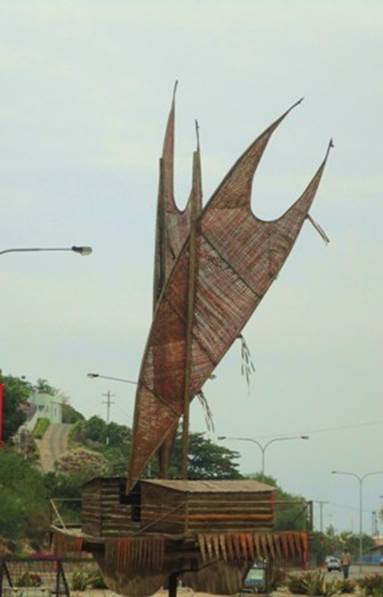
Many very intricately carved models of
these boats were on display. How they ever managed to sail with this type of
rig is amazing. I think it was mainly for the tropical waters with light
winds. Nowadays, their small sailing dugouts offer no shelter, and have very
light spinnaker weight lugsails, or scraps of tarpaulin if nothing else is
available. Of course, these sails are originally hand woven, which they
could still do, but seem too lazy to do.
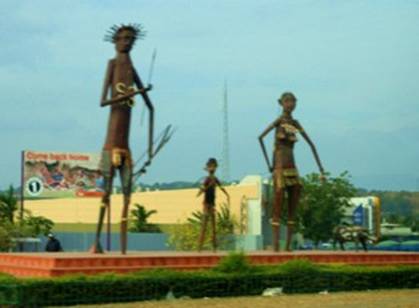
The poster behind these statues says :
COME BACK HOME. Papuans are so torn between their own ancient civilisation
and that of our Western ways. They have been living on these islands for
70,000 years, and despite many constant battles between rival tribes,
progress for them is not going the way they anticipated it. But then, where
has it been easy? There are 800 languages in Papua, so isolated are the
tribes from each other, that’s nearly one third of all the
world’s languages! The Western part of Papua, called Irian Jaya owned
by Indonesia is gradually converting these native Papuans by ensuring that
those that are there only marry Indonesians. Hence the Papuan race and beliefs
will gradually die out over the next few generations, and they will all have
become Indonesian. Not so sure that is going to be any different than what
happened in East Timor – where they got rid of the natives by flushing
them out of the jungle and having mass genocide.
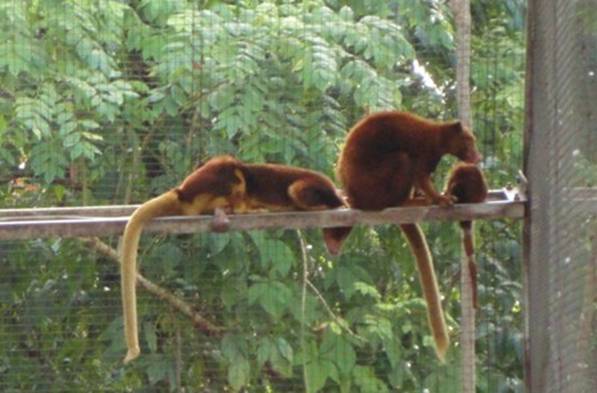
The botanical gardens provide a small
snapshot of fauna which is native to Papua, including one of the birds of
paradise which we did see, although not in all its glorious feathers! This
poor native tree kangaroo is very nearly extinct, being hunted as food by one
indigenous tribe in the highlands.
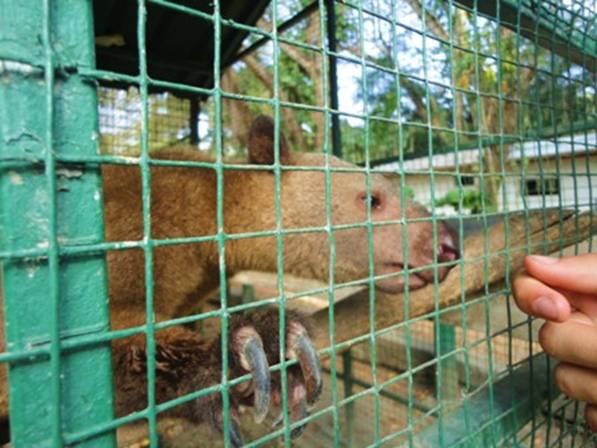
Ollie made friends with it straight
away, I wouldn’t fancy those claws digging into me? Thankfully, a very
enterprising Australian man has been living amongst the tribe causing the
havoc for the last 2 years now, with his wife and two young children. He
took chickens with him for them to breed and replace as they food. He
travels on foot with the tribesmen between rival villages, and is gradually
getting them to understand that soon there will be no tree kangaroos left if
they continue that part of their lifestyle!
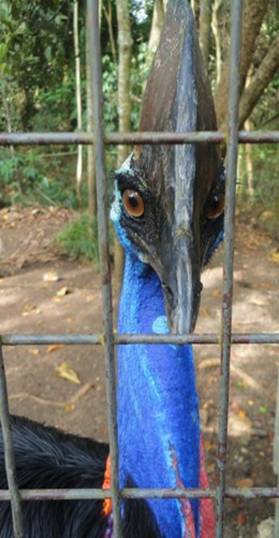 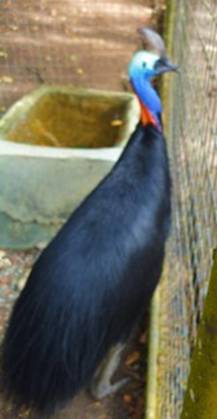
The cassowary is native to Northern
Territories, Queensland and of course here in Papua. Same thing is happening
of course, in Australia, they are being run over by cars, here they are used
as food, they are so similar to the ostrich and emu.
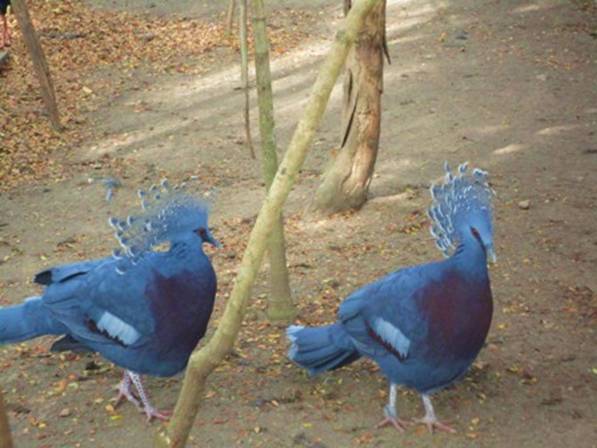
These pigeons (couldn’t find
their name) are so beautiful, wouldn’t Trafalgar square be more
attractive with these to attract our attention? I’m not sure if they
breed as fast as our native pigeons do, hence the reason for their being kept
in captivity!
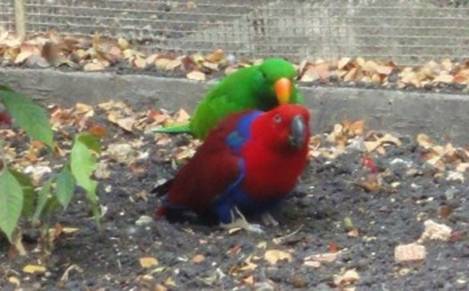
The eclectic parrot obviously has not
trouble breeding in captivity. Here the green male is about to pounce on the
red female, he’s got that evil eye on here hasn’t he?
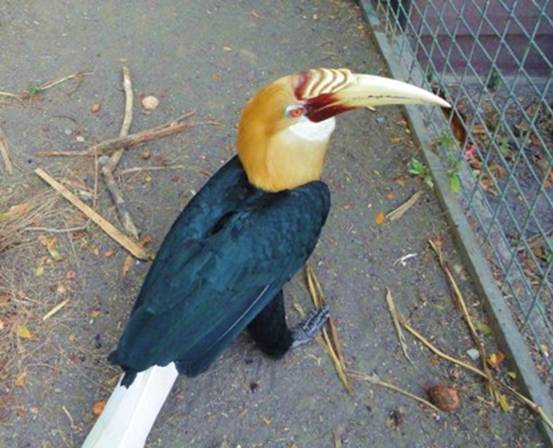
This magnificent hornbill has a mate in
his cage too, how sad that the only means of safeguarding these splendid
animals is to keep them in captivity!
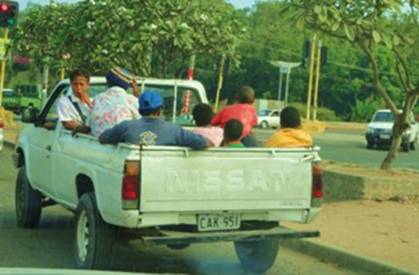
Meanwhile, life in Port Moresby
continues. Transport is either in the back of a family member’s
pick-up or by local bus
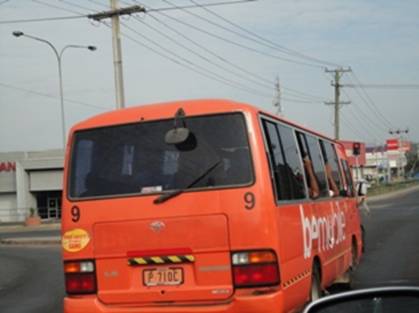
It’s not a good idea to be
walking about on the streets, or we might be assaulted also!
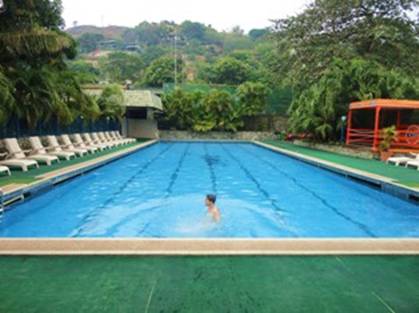
Thank goodness we found the local AVIAT
social club swimming pool only a 3 minute walk away from the Port Moresby
Yacht Club. We had the place to ourselves in mid-morning. Simply glorious
to chill out and have a bit of excercise!
|

